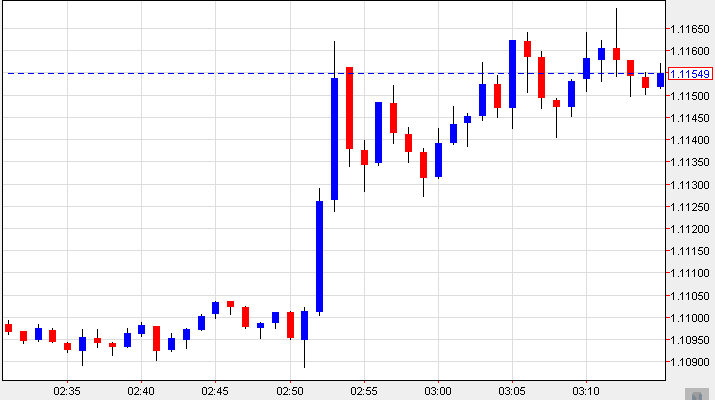While there were key macroeconomic data out of Asia earlier in the session, with Japan revising its Q1 GDP up from 2.4% to 3.9% (due to an upward revision to capex) making some wonder if it simply didn’t snow in Japan this winter, as well as Chinese trade data that was once again disappointing with the third consecutive drop in exports coupled with an 18.1% collapse in imports hinting that nothing is going well in China’s economy (which once again sent stocks soaring this time up another 2.2% on certainty another PBOC rate cut is imminent, pushing the PBOC to a fresh 7-year high of 5,132), it was actually a leaked Obama comment on the strong USD that moved markets.
Shortly before 3 am Eastern, BBG blasted the following:
- FRENCH OFFICIAL: OBAMA SAID STRONG DOLLAR IS PROBLEM
Which promptly set the USD tumbling:

… before just one hour later, the US realized leaks like this are not allowed, the Fed as an “independent” organization, and that Obama really meant the strong USD is good if anything, we got the following headline:
- U.S. OFFICIAL: OBAMA DIDN’T SAY STRONG DOLLAR WAS A PROBLEM
Which in turn strengthened the USD…Â

… but only modestly showing that the market realized the official US position had indeed been leaked and that as explained before, the Fed is cornered, on one hand unable to hike due to further USD profit-crippling strength, on the other unable to keep rates low over market stability and credibility concerns.
In other news, with Greece hanging around Europe’s neck and this week seen by most as the decisive one in which a deal needs to get done ahead of a the June 30 “red line” deadline, German stocks are finally feeling it and a few hours ago the Dax entered correction territory, dropping 10% from its April highs.
Elsewhere, as previously reported, following yesterday’s surprise Turkish election outcome, the Turkish Lira continued its plunge, and dropped as much as 5% in earlier trading to a record low 2.80 before correcting modestly. In related news, the MSCI’s main Emerging Market index posted its longest, 11-day losing run since 1990 driven by the 6% tumble in Turkish stocks.
Emerging market stocks drop for an 11th day: That hasn’t happened since 1990… pic.twitter.com/jKoybdbe7j
— Mark Barton (@markbartontv) June 8, 2015
A more in depth-look at global markets from RanSquawk notes that Asian equities struggled to find direction as participants reacted to Friday US NFP report, which saw US equities finish in the red as participants brought forward rate lift-off expectations. This further weighed on emerging market stocks which are now on course for their longest slump since 1990. Nikkei 225 (-0.02%) fell as final Q1 GDP revisions marked the best quarter for Japanese growth in 2yrs, tempering possibility of near-term BOJ easing (Q/Q 1.0% vs. Exp. 0.7% (Prev. 0.6%). Elsewhere, the Shanghai Comp. (+2.2%) and Hang Seng (+0.21%) rose with the former extending on 7-year highs, as participants digested today’s mixed Chinese trade data. The headline reading posted the 3rd largest surplus on record (59.49bln vs. Exp. 44.80bln) while exports and imports saw a 3rd and 7th consecutive monthly decline, respectively.
European equities kick off the week in the red, with the DAX officially slipping into correction territory as the index has fallen by around 10% from highs seen in April. Today’s session has been largely dominated by a number of major M&A stories in Europe, including Shire (-1.6%), Actelion (+7.6%), Diageo (+6.5%), BT (+1.2%) and Deutsche Telekom (+0.2%).
Elsewhere, Deutsche Bank (+5.8%) are among the best-performing stocks in Europe after Co-CEO’s Jain and Fitschen stepped down, with optimism surrounding the German Bank as incoming CEO John Cryan is said to be responsible for the turnaround of UBS whilst serving as CFO.

